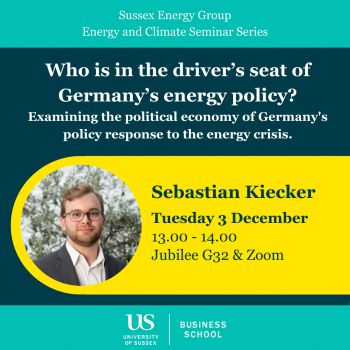Business School events
Browse events involving the University of Sussex Business School.
Who is in the driver's seat of Germany's energy policy?
Tuesday 3 December 13:00 until 14:00
Online : Jubilee G32 & Zoom
Speaker: Sebastian Kiecker
Part of the series: Energy & Climate Seminar Series

This seminar will be held in a hybrid format. To join this seminar online, please register through this link: Register Here
Abstract
The war in Ukraine has exposed Germany's strategic dependencies and vulnerabilities in both its energy policy and economic model. Despite a Green-led Ministry for Economic Affairs and Climate Action, the country’s response to the gas crisis appears to shield the very industries that contributed to and benefited from these dependencies. Historically, the economics ministry has maintained strong ties with energy- and carbon-intensive sectors, influencing policy across previous coalition governments. With the Greens now heading the ministry, expectations were high for a significant policy shift. To assess the extent of industry influence on Germany's energy policy during the crisis, particularly the role of energy-intensive industries, we analysed the distributive effects of the crisis response measures. Through frame analysis and process tracing, we explored whether, and if so, how these industries formed coalitions, shaped policy decisions, and seized the window of opportunity to strengthen their influence over Germany’s energy policy.
Biography
Sebastian is a PhD student in Political Science at the University of Tartu, with a Bachelor’s degree in Politics, Philosophy, and Economics (PPE) and an Erasmus Mundus Master’s Degree in Economics. His academic focus lies in the political economy of energy transitions, with his PhD research examining how East Central European countries are reshaping their growth models in response to the energy transition. This research explores both domestic political economy and EU economic governance factors. As a think tanker, Sebastian has worked on the economics and political economy of security-oriented energy policy and EU industrial policy.
By: Ruby Loughman
Last updated: Friday, 13 September 2024